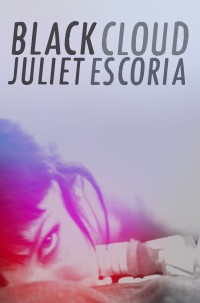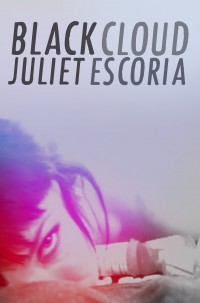25 Points: Black Cloud
 |
Black Cloud
by Juliet Escoria
Civil Coping Mechanisms, 2014
144 pages / $13.95 buy from Amazon
|
1. For some reason, I find this book really blackly funny sometimes. Maybe this is a strange reaction, I don’t know. More on this later.
2. Some of it is a bit like those bits in Breaking Bad where Jesse ‘falls of the wagon’ and goes back to taking drug and his house reflects it. I thought those bits in Breaking Bad were ok so this is a compliment.
3. This makes me think about something that may be culturally different between drug cultures in the US and drug cultures in the UK. In the UK, apart from in the eyes of the tabloid media, the law, etc., pretty much all drugs such as amphetamines, MDMA, weed, coke, acid, even, are all pretty much seen as sort of fairly clean-living party drugs and only heroin and, probably, crack are sites of visceral misery-literature style affairs, sites of crack-dens, heroin hangouts etc. The party drugs are just fine and clean-living things to anyone initiated into them with no sort of self-hatred or self-development or depression surrounding them necessarily because that’s reserved just for heroin and crack alone in the UK. This is my experience anyway but maybe everyone else in the UK would disagree. It just makes me wonder about the cultural differences as far as drugs are concerned and this book is a great example of that. Why not be honest about a common drug culture in US literature as this book and most Alt-Lit does, it screws up all those ‘wholesome’ Christian-Right bullshit images of religious-corporate America so that’s a good thing.
4. A point related to this. 12-step therapy seems different here in the UK compared to the US but also pretty similar. I like to feel these cultural differences.
5. Points 3 and 4 are maybe a thing for Alt-Lit more generally rather just this book but this book does do a good job of exemplifying something that I’ve been trying (and probably failing to articulate) and how wrong I was. More on this later.
6. “Therapists have looked at me, their eyes pleadingly wet and round, and said that growing up in a household like mine must have not felt that strange because it was all I knew. I can’t say this was true for me, not quite, because I do remember the pliancy of things, how nothing ever felt like it was happening at the right time or would stay standing up”. This is one of my favourite lines in the book because it’s also happened to me, as I grew up in a similar situation as the character in this story/author (the membrane is thin in this book, I’m guessing) and it feels true and I know it to be true and what more can you want sometimes from fiction if not some kind of truth?
7. The films that accompany this book are fucking ace by the way. Search them out on Vimeo. They’re some of the best films I’ve seen accompanying a book. I like films that accompany books. These are quite Lynchian at times and other times like a Kate Bush video somehow.
8. “Then my mother took me across the hall, closed the door, turned on the record player, Jane’s Addiction (I still hate that band)…” This is my second favourite, no my equal favourite, line in the book (from the same story – maybe I’m biased, maybe it’s why I said I found quite a bit of this blackly funny?) again because it is so true. I must be older than Julia because mine was Bob Dylan and Neil Young both of which I like now, wounds heal occasionally or sometimes you realise that it was just two contexts mixing up in an unfortunate way. Childhood memories are like this (good or bad ones, although in reality they’re always mixed) and she captures it beautifully and economically in that simple Jane’s Addiction detail. I’ll vote for this book all day on the strength of that detail.
9. This entire book isn’t blackly funny to me, by the way. Although, I wasn’t being flip when I said that, some of it is (but maybe I’m biased towards it). It couldn’t be blackly funny throughout to anybody. Some things are very sad in it, occasionally brutal. The ambivalence of life is herein. It oscillates at times, like most of, like some of, life does between extreme visceral misery and extreme visceral joy.
10. If you want poetry, consider the comparison between the two images of a mother on page 57 — one where she is modelling in a magazine and the other where she is “dirty and buzzing in the bright morning light” READ MORE >
August 26th, 2014 / 1:24 pm
25 Points: Black Cloud
 |
Black Cloud
by Juliet Escoria
Civil Coping Mechanisms, 2014
144 pages / $13.95 buy from Amazon
|
1. Juliet Escoria, as a writer, is like a birthday present you didn’t expect to get but secretly hoped you would.
2. It’s hard to pick a “favorite” from Black Cloud—but my top three would probably be “Heroin Story”, “Reduction”, and “I Do Not Question It”.
3. I feel like I know all of Escoria’s characters. I empathize with them. I care about them. I want to fuck up all the shit that made them miserable because, to me, they deserve better.
4. There are stories within these stories—little hints into the lives of these characters that stick with you.
5. Playlist for this book: Gary Jules’ version of “Mad World” on repeat.
6. Feel like Escoria is a new-age Bukowski but is extremely new and original at the same time.
7. These stories seem so real that I can’t decide if Escoria actually lived through all this or not. (Probably took experiences from her own life to build around these stories—that’s obvious—but I’m more so troubled with the idea that her life has been that awful thus far.)
8. Declaration: Black Cloud is the best work produced by a new, young writer this year and I challenge anyone to top it. (Spoilers: you won’t.)
9. Black Cloud makes you realize how good your life is.
10. Sadly, a lot of Generation Y can relate to the absence of fathers in this story collection.
June 26th, 2014 / 12:00 pm
